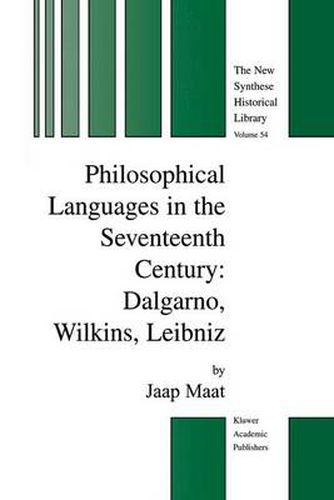Readings Newsletter
Become a Readings Member to make your shopping experience even easier.
Sign in or sign up for free!
You’re not far away from qualifying for FREE standard shipping within Australia
You’ve qualified for FREE standard shipping within Australia
The cart is loading…






This title is printed to order. This book may have been self-published. If so, we cannot guarantee the quality of the content. In the main most books will have gone through the editing process however some may not. We therefore suggest that you be aware of this before ordering this book. If in doubt check either the author or publisher’s details as we are unable to accept any returns unless they are faulty. Please contact us if you have any questions.
This book discusses three linguistic projects carried out in the seventeenth century: the artificial languages created by Dalgamo and Wilkins, and Leibniz’s uncompleted scheme. It treats each of the projects as self contained undertakings, which deserve to be studied and judged in their own right. For this reason, the two artificial languages, as well as Leib niz’s work in this area, are described in considerable detail. At the same time, the characteristics of these schemes are linked with their intellectual context, and their multiple interrelations are examined at some length. In this way, the book seeks to combine a systematical with a historical ap proach to the subject, in the hope that both approaches profit from the combination. When I first started the research on which this book is based, I intended to look only briefly into the seventeenth-century schemes, which I assumed represented a typical universalist approach to the study of lan guage, as opposed to a relativistic one. The authors of these schemes thought, or so the assumption was, that almost the only thing required for a truly universal language was the systematic labelling of the items of an apparently readily available, universal catalogue of everything that exists.
$9.00 standard shipping within Australia
FREE standard shipping within Australia for orders over $100.00
Express & International shipping calculated at checkout
This title is printed to order. This book may have been self-published. If so, we cannot guarantee the quality of the content. In the main most books will have gone through the editing process however some may not. We therefore suggest that you be aware of this before ordering this book. If in doubt check either the author or publisher’s details as we are unable to accept any returns unless they are faulty. Please contact us if you have any questions.
This book discusses three linguistic projects carried out in the seventeenth century: the artificial languages created by Dalgamo and Wilkins, and Leibniz’s uncompleted scheme. It treats each of the projects as self contained undertakings, which deserve to be studied and judged in their own right. For this reason, the two artificial languages, as well as Leib niz’s work in this area, are described in considerable detail. At the same time, the characteristics of these schemes are linked with their intellectual context, and their multiple interrelations are examined at some length. In this way, the book seeks to combine a systematical with a historical ap proach to the subject, in the hope that both approaches profit from the combination. When I first started the research on which this book is based, I intended to look only briefly into the seventeenth-century schemes, which I assumed represented a typical universalist approach to the study of lan guage, as opposed to a relativistic one. The authors of these schemes thought, or so the assumption was, that almost the only thing required for a truly universal language was the systematic labelling of the items of an apparently readily available, universal catalogue of everything that exists.